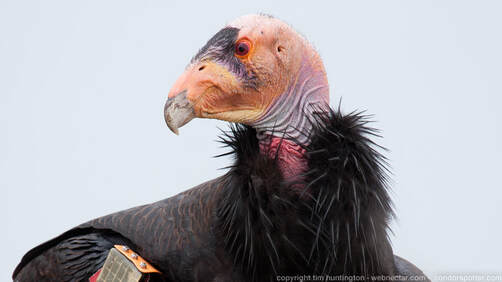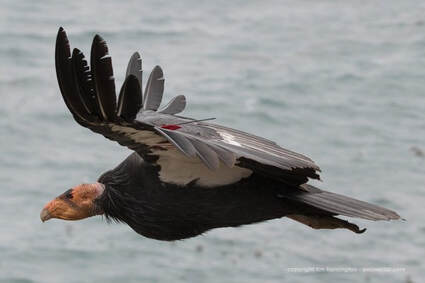Loading bio data
Believe it or not, Redwood Queen (190)'s old nickname used to be "Slope Slug". This name was given to her because she rarely moved more than a quarter mile from the release slope when first introduced into the wild. We also originally believed her gender to be male! When she began displaying female courtship behaviors, however, we contacted the Los Angeles Zoo where she was hatched, and the error was corrected. Redwood Queen (190) was given her new nickname in honor of her favorite trees in Big Sur.
As far as condor status goes, Redwood Queen (190) was at the bottom of the dominance hierarchy when she was first released. She was mercilessly harassed by the rest of the flock and forced to wait until everyone else had fed before approaching a carcass. Many years later, she paired with Kingpin (167), the most dominant male in the Big Sur flock. Since then, she and Kingpin (167) produced six biological chicks together, including the famous Iniko (1031). Iniko (1031) survived the 2020 Dolan Fire inside the cavity of the redwood tree where Redwood Queen (190) and Kingpin (167) had nested. Viewers from around the world watched the live VWS/explore.org nest cam as flames surrounded Iniko (1031)'s nest. Iniko (1031) and Redwood Queen (190) were later discovered to have survived the fire, only to find out that Kingpin (167) had not.
In 2021, Redwood Queen (190) nested again with a new dominant male, Phoenix (477). She chose to lay her egg in the same redwood tree cavity where she and Kingpin (167) originally nested with Iniko (1031) in 2020. Not all condor eggs hatch and, unfortunately, the hatch date estimated for late April 2021 came and went, without a chick emerging from their egg.
In 2022, Redwood Queen (190) and Phoenix (477) moved to a nesting site previously occupied in 2018 by Phoenix (477) and his former mate, Condor (547). Redwood Queen (190) and Phoenix (477) were successful in raising their chick, Wiley (1174), in this new location. Then, in November of 2023, Phoenix (477) went missing. Redwood Queen (190) has since paired with Zenith (650), a condor who has been courting her for years. They are currently raising a chick in Redwood Queen (190)'s old nest territory where she raised Iniko (1031).
As far as condor status goes, Redwood Queen (190) was at the bottom of the dominance hierarchy when she was first released. She was mercilessly harassed by the rest of the flock and forced to wait until everyone else had fed before approaching a carcass. Many years later, she paired with Kingpin (167), the most dominant male in the Big Sur flock. Since then, she and Kingpin (167) produced six biological chicks together, including the famous Iniko (1031). Iniko (1031) survived the 2020 Dolan Fire inside the cavity of the redwood tree where Redwood Queen (190) and Kingpin (167) had nested. Viewers from around the world watched the live VWS/explore.org nest cam as flames surrounded Iniko (1031)'s nest. Iniko (1031) and Redwood Queen (190) were later discovered to have survived the fire, only to find out that Kingpin (167) had not.
In 2021, Redwood Queen (190) nested again with a new dominant male, Phoenix (477). She chose to lay her egg in the same redwood tree cavity where she and Kingpin (167) originally nested with Iniko (1031) in 2020. Not all condor eggs hatch and, unfortunately, the hatch date estimated for late April 2021 came and went, without a chick emerging from their egg.
In 2022, Redwood Queen (190) and Phoenix (477) moved to a nesting site previously occupied in 2018 by Phoenix (477) and his former mate, Condor (547). Redwood Queen (190) and Phoenix (477) were successful in raising their chick, Wiley (1174), in this new location. Then, in November of 2023, Phoenix (477) went missing. Redwood Queen (190) has since paired with Zenith (650), a condor who has been courting her for years. They are currently raising a chick in Redwood Queen (190)'s old nest territory where she raised Iniko (1031).







